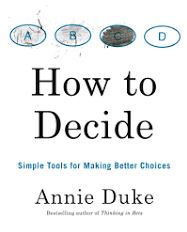
How to Decide
Analysing past decisions
We always tend to judge our past decisions based on the outcomes rather than looking at the process involved in making them. The author makes a very valid point. To improve decision-making skills, analyze past decisions based on the process rather than just the outcomes. Hindsight bias distorts our memory of what we knew at the time, leading to repeating poor decisions. Using a “Knowledge Tracker” can reduce this bias by clarifying what we knew and when we knew it, preventing post-outcome information from influencing our evaluation.
Decision making process
The author states a six-step process to improve the quality of both new decisions on your horizon and your assessment of past decisions. To make an informed decision: list possible outcomes, evaluate preferences based on values, estimate probabilities, compare the likelihood of favorable/unfavorable outcomes, repeat for other options, compare options, and make a decision.
It’s hard to accurately assess a decision after the fact, in the shadow of an outcome that has already happened. But if you have a good decision process going forward, and keep a record of it, you’ll be a lot better off. You won’t have to wonder after the fact whether a decision was good or bad, under the haze of resulting and hindsight bias. Instead, you’ll be able to check your work.
Combine the Inside View and The Outside View to make better decisions. Making decisions based solely on your personal perspective is called the inside view. It’s important to combine this with the outside view, which is the objective truth beyond your perspective. The outside view serves as a helpful reality check.
Breaking Free from Analysis Paralysis
We sometimes spend a lot of time making unimportant decisions while taking very important ones in a hurry. The book highlights how to spend your decision-making time more wisely. Time is a limited resource. There is a trade-off between time and accuracy. Increasing the accuracy of a decision costs time, but saving time costs accuracy.
When making a decision, consider if it will significantly affect your happiness in the next year, month, or week. The shorter the negative impact, the faster you can decide, but it may not be as accurate. “Freerolling” means the potential gains are much higher than the losses. It’s a low-risk, high-reward opportunity that shouldn’t be missed. Take time to implement it properly. Close Decisions; Don’t stress too much when faced with two seemingly equal choices. The payoffs are likely similar, so choose quickly. To simplify, ask yourself, “What’s the potential error, whichever I choose?”. To make better decisions, consider the cost of quitting. Lower costs allow for experimentation and changing course as new information becomes available.
Executing Decisions
We are pretty good at setting positive goals for ourselves. Where we fall flat is in executing the things, we need to do to achieve them. Negative thinking is important. Instead of fearing failure, imagine potential obstacles and plan ways to overcome them. This approach, known as mental contrasting, can help achieve goals by proactively addressing challenges. Climbing to the summit gives a broader perspective. Combine mental contrasting with mental time travel for better results. Mental time travel is imagining yourself in the past or future. Use this ability for decision-making with prospective hindsight. Try the premortem technique to identify potential reasons for failure. Project yourself into the future where your objective has not been achieved and envision the scenario.
I must say, I found this book to be incredibly beneficial as I believe what we are is because of the decisions we make. That’s why we should care about making better decisions. Two things determine how life turns out – luck and the quality of your decisions. You can’t affect luck, but you can affect the quality of your decisions. Improving the quality of the decisions increases the odds of good things happening to you. The future is inherently uncertain, so good decisions cannot guarantee outcomes. They just make good outcomes more likely.
Shahil Shah
May 2023
